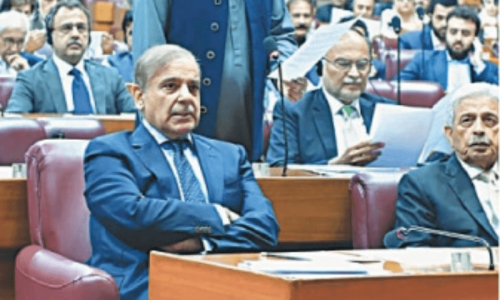ISLAMABAD March 14: The federal government has directed the provincial home secretaries to stop the publications of all the banned militant organizations which continued to appear in the market despite freezing of their assets and accounts.
Investigations revealed that a number of publications and websites were still being maintained by the militant organizations despite the government ban. In some instances, it was noticed that the banned organizations have started publishing newspapers under different names after the government crackdown.
The interior ministry additional secretary, Abdul Rashid Khan, when contacted, said last week, the ministry had sent a directive to the provincial governments to ensure the ban on publications of militant organizations under the relevant clauses of the Anti-Terrorism Act.
A list, naming the publications of the militant organizations, was also sent to the provinces, he said.
The list of 23 publications sent by the interior ministry includes one quarterly magazine, one fortnightly magazine, 17 monthly magazines and four weekly magazines.
Sources said that besides the 23 publications identified by the interior ministry a number of publications brought out by the banned outfits were available in the market.
Publications by the banned Lashkar-i-Taiba include monthly Voice of Islam, English; monthly Al- Ribat, Arabic; monthly Majallah Al-Daawa, Urdu; monthly Tayyibat, Urdu for women; monthly Zarb-i-Taiba, Urdu for youth and students; weekly Jihad Times, Urdu and Sindhi.
Besides, the organization also has a web-based, Radio Al-Jihad in Urdu and Arabic at http://www.markazdawa.org. The site offers news and related web links to militant coverage of news items.
Harkatul Mujahideen, sources said, printed monthly Sada- i-Mujahid and weekly Al-Hilal, copies of which are sent complimentary to the families of Shaheeds (martyrs). Jaish-i-Mohammad, another banned militant outfit published fortnightly Jaish-i-Mohammad Urdu and English, and monthly, Bint-i-Ayesha, Urdu for women. Jaish also offers electronic newsletter at its website http://www.jaish-i- Muhammad.org. Recently the site is displaying the message of being “under-construction.”
Al-Rasheed Trust, ostensibly a charity organization whose accounts and assets were frozen under the United Nations Security Council Resolution, published daily Islam, Urdu and weekly Zarb-i-Momin, Urdu/English. Though the government tried to ban the publication of Zarb-i- Momin, its weekly newsletter and information about welfare activities undertaken by Al-Rashid Trust were available on the internet at http://www.ummah.net.pk/dharb/. The newspaper claims to be “the only newspaper that publishes authentic news on Afghanistan, Taliban, Islam and Muslim world.”
Another publication, Daily Islam, Karachi/Islamabad, launched on Sept 18, 2001, after attacks in New York and Washington claims that its 60,000 copies are sold everyday throughout the country.
A study carried out by a German NGO shows that Kashmir- specific publications making their regular appearance on the newsstands include monthly, Mahaz-i-Kashmir, published by Jamiatul Mujahideen, Jammu and Kashmir; monthlies, Shahadat Urdu, The Message English, and an Arabic monthly Tehreekul Mujahideen, Jammu and Kashmir; fortnightly Jihad-i-Kashmir by Jamaat-i- Islami, Jammu and Kashmir, and monthly Kashmir Digest Urdu/English printed in Birmingham, United Kingdom, for Kashmiri expatriates and Kashmiris in South Asia.
Requesting anonymity, officials in the ministry said legal and technical difficulties were being encountered in blocking the websites of the banned organizations. Most often, if a website was blocked, the organizations put up new websites under a different address.
“We have requested the government to make necessary amendments to the Anti-Terrorism Act for taking action against the websites of the terrorist organizations,” the additional secretary said.
The content analysis of the publications on the web revealed many Jihadi outfits print magazines and offer services in Arabic on their websites instead of offering any publications in Pushtoo, Dari, or Kashmiri which are the local and popular languages of Afghanistan and Kashmir and are the theatres of their main operations.
Sources said the publication houses could conveniently help whiten the black money pouring into the Jihad industry along with attracting much more in the name of donations for the cause.
The decision to opt for publications in Arabic language by the outfits also hinted at this aspect, sources said, adding, details of the bank accounts and properties of the office-bearers of militant organizations were being collected by the law enforcement agencies.
Officials said the interior ministry had also passed instructions to the respective provincial authorities for collecting details about the printing presses, traders and computer designers who published literature of the militant organizations. People who are sponsoring and funding such activities would also be brought under the net, the officials said.
However, the officials conceded that difficulties were encountered in getting the documented sources of funding of the militant organizations as majority of organizations, apart from one known account, were maintaining multiple accounts under different heads.













































Dear visitor, the comments section is undergoing an overhaul and will return soon.